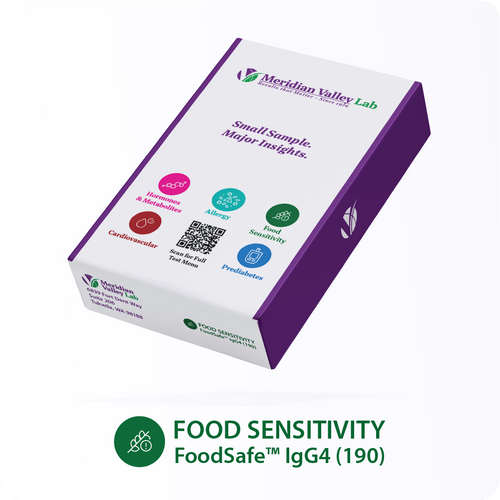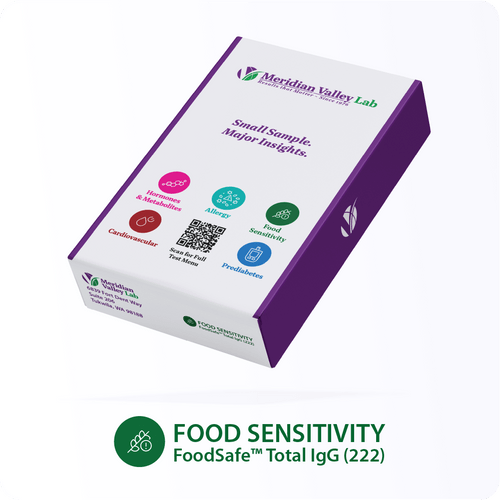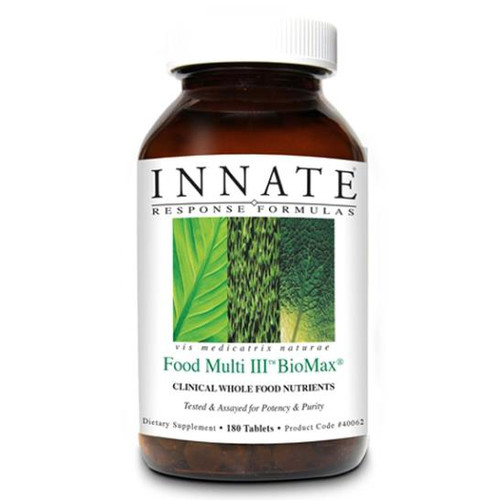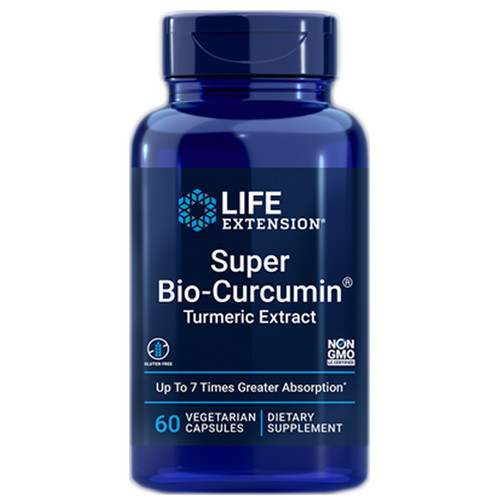Product Overview
FoodSafe™ IgG4 (95) (Fingerstick)
https://www.meridianvalleylab.com/services/foodsafe-basic-food-profile/
The FoodSafe Basic Profile is a bloodspot-based food sensitivity test that screens for IgG4 antibody reactions to 94 commonly eaten foods. It also includes a Candida albicans antibody screen, helping patients and practitioners explore potential triggers of symptoms such as digestive upset, skin conditions, fatigue, or mental fog.
Meridian Valley Lab (MVL) uses the well-validated ELISA method to measure immune reactions. Results are categorized as low, moderate, or high, making it easier to take action with dietary or lifestyle changes.
Because it uses a simple finger-prick bloodspot kit, this test is accessible for pediatric testing and clinics without phlebotomy services.
Why Use the FoodSafe Basic Profile for Food Sensitivity Testing?
The FoodSafe Basic Panel is ideal for identifying delayed-onset food reactions, which often go undetected in traditional allergy testing. By measuring IgG4 antibody levels, this panel uncovers sensitivities that may contribute to long-term inflammation, poor gut health, or chronic conditions.
In addition to food sensitivity screening, the test also includes a Candida albicans screen. While Candida is naturally present in the gut, excess growth can trigger immune responses that mimic food intolerance. A moderate or high Candida result suggests the body has produced antibodies to manage overgrowth—possibly pointing to an imbalance worth addressing.
Learn more about Candida overgrowth and treatment options from Cleveland Clinic’s Candida Overview.
What Does the FoodSafe IgG4 (95) Profile Measure?
This test evaluates immune response to:
-
94 common foods, including dairy, meats, fruits, vegetables, grains, and nuts
-
Candida albicans IgG4 antibodies
-
Results organized into low, moderate, and high categories
The analytes included in this test are the following:
Dairy
• Casein • Cheddar cheese • Cottage cheese • Cow’s milk • Goat’s milk • Mozzarella cheese • Whey
Meats
• Beef • Buffalo • Chicken • Egg white • Egg yolk • Lamb • Pork • Turkey
Fish
• Cod • Halibut • Salmon • Sardine • Sole • Tilapia • Trout • Tuna
Shellfish
• Clam • Crab • Lobster • Oyster • Shrimp
Vegetables
• Asparagus • Beet • Black olive • Broccoli • Cabbage • Carrot • Cauliflower • Celery • Cucumber • Garlic • Green bean • Green pepper • Kidney bean • Lentil • Lettuce • Lima bean • Onion • Pea • Potato • Pumpkin • Soy • Spinach • Tomato
Grains
• Barley • Buckwheat • Corn • Gliadin • Gluten • Hemp • Oat • Quinoa • Rice • Teff • Wheat
Nuts
• Almond • Peanut • Pecan • Pumpkin seed • Sesame seed • Sunflower seed • Walnut
Fruits
• Apple • Apricot • Avocado • Banana • Blueberry • Cranberry • Grapefruit • Lemon • Orange • Papaya • Peach • Pear • Pineapple • Plum • Raspberry • Red grape • Strawberry • Watermelon
Miscellaneous
• Baker’s yeast • Brewer’s yeast • Cane sugar • Coffee • Honey • Mushroom • Xanthan gum
Candida Screen
• Candida albicans
CAUTION: Do not use this product if you have a blood clotting disorder or are using prescribed blood thinning medications, unless otherwise advised by your healthcare provider.
Medications and Precautions
Medications such as antihistamines, methotrexate, tricyclic antidepressants, H2-receptor antagonists (e.g., ranitidine, cimetidine), proton-pump inhibitors, and over-the-counter pain and fever reducers do not interfere with the accuracy of the ELISA test method.
Immune suppressive medications (e.g.: prednisone) or a weakened immune system (e.g.: due to chemotherapy) may result in the inability to mount an antibody response to varying degrees, resulting in lower values.
This medication list is not inclusive. Please discuss your medications with your healthcare practitioner. Some practitioners may advise their patients to discontinue certain medications for a period of time depending on their practice and experience.









